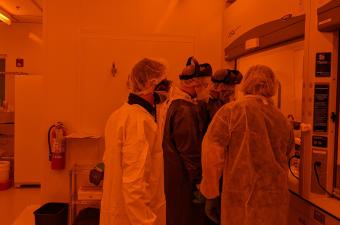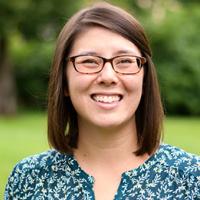Quantum industry needs engineers. Colorado School of Mines is co-sponsoring NSF workshop to build the educational roadmap
“Quantum technology has reached a stage where it cannot succeed without engineering input and engineering leadership," says Mines' Lincoln Carr

Colorado School of Mines students learn lithography in the cleanroom as part of their quantum engineering studies. Mines is home to one of only two quantum engineering master's degree programs in the nation. (Photo by Meenakshi Singh)
Quantum supremacy is here, but as of today, there are no undergraduate major or minor degree programs in quantum engineering in the U.S. and only a handful of offerings at the master’s degree level.
Faculty at Colorado School of Mines, along with the National Science Foundation, are gathering representatives from industry, national laboratories and universities across the country for a virtual workshop later this month aimed at changing that.
“Quantum technology has reached a stage where it cannot succeed without engineering input and engineering leadership,” said Lincoln Carr, a professor of physics and quantum researcher at Mines who is chairing the workshop. “There are so many things working together in these systems — to make these technologies work, you need engineers who understand microwave control systems, materials defects, things like that. It’s electrical engineering, it’s materials science, it’s systems engineering.”
The goal of the two-day NSF Workshop on Quantum Engineering Education on Feb. 25-26 is to build a roadmap to establishing the robust and diverse student pipeline and educational infrastructure that the U.S. and its businesses need to lead the quantum revolution.
“We need well-trained engineers who are quantum aware, not just PhD physicists,” Carr said. "That work starts at the undergraduate level."
A wide range of universities, colleges, national labs and industry partners have signed up to participate in the conversations. On the workshop’s organizing committee alone are researchers from Google, MIT, Harvard, Stanford, Duke, San Jose State, University of Colorado, Harvey Mudd, University of Oregon, University of Wisconsin and NIST, along with Mines.
Key questions that the workshop aims to tackle include:
- What is quantum engineering and what kind of quantum engineers does the nation need?
- What are the best ways to educate quantum engineers in different university environments?
- How can we build affordable hands-on quantum education at the undergraduate level?
- Does quantum engineering require its own department, or is it better implemented as a specialized track in existing engineering disciplines?
- What courses should be included in a quantum engineering major or minor?
- How do we increase diversity in our quantum engineering students?
- What kind of support, NSF or otherwise, is required to get quantum engineering off the ground?
Among the Mines researchers presenting at the workshop are Eliot Kapit, director of Mines’ Quantum Engineering Program, currently one of only two in the nation offering master’s degrees in the field (the other is at Duke University), and Judith Klein-Seetharaman, an associate professor of chemistry who helped to launch Mines’ interdisciplinary program in quantitative biosciences and engineering.
Launched in Fall 2020, the Quantum Engineering Program at Mines currently offers thesis and professional (non-thesis) master’s degrees, as well as graduate certificates, aimed at equipping students for careers in emerging technologies based on quantum information. Master’s students can choose from one of two tracks — quantum engineering hardware, focused on experimental techniques relevant to quantum technology; and quantum engineering software, which focuses on theory, algorithms and simulation. Students also get hands-on experience with helium-cooled units and low-temperature microwave measurement, key technologies for virtually all solid-state quantum computing systems.
For more information about the workshop, go to https://www.osa.org/en-us/meetings/topical_meetings/quantum_engineering_education_workshop/.




